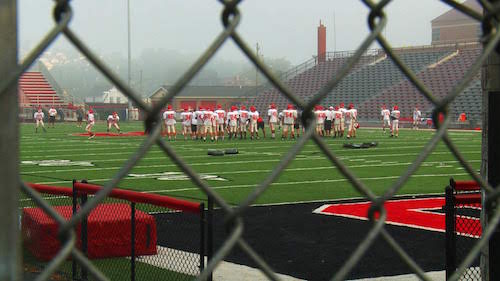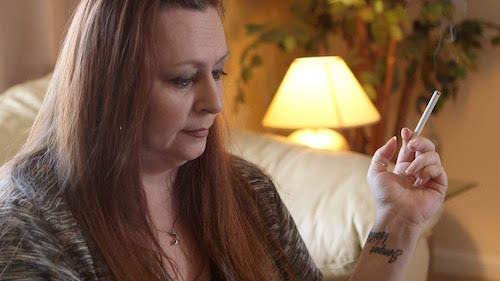Communiqué
Steubenville, Ohio Crime Told In: POV: “Roll Red Roll” | Monday, June 17 at 10 pm
< < Back to steubenville-ohio-crime-told-in-pov-roll-red-roll-monday-june-17-at-10-pmPOV: Roll Red Roll
Monday, June 17 at 10 pm on WOUB
Go behind the headlines of the assault of a teenage girl by members of a high school football team, uncovering the deep-seated and social media-fueled “boys will be boys” culture at the root of high school sexual assault in America.
Roll Red Roll is a true-crime thriller that goes behind the headlines to uncover the deep-seated and social media-fueled “boys will be boys” culture at the root of high school sexual assault in America.
 At a pre-season party in small-town Steubenville, Ohio, a heinous crime took place: the assault of a teenage girl by members of the beloved high school football team. What transpired would garner national attention and result in the sentencing of two key offenders. But it was the disturbing social media evidence uncovered by crime blogger Alexandria Goddard that provoked the most powerful questions about the collusion of teen bystanders, teachers, parents and coaches to protect the assailants and discredit the victim. As it painstakingly reconstructs the night of the crime and its aftermath, Roll Red Roll uncovers the ingrained rape culture at the heart of the incident, acting as a cautionary tale about what can happen when teenage social media bullying runs rampant and adults look the other way. The film unflinchingly asks: “Why didn’t anyone stop it?”
At a pre-season party in small-town Steubenville, Ohio, a heinous crime took place: the assault of a teenage girl by members of the beloved high school football team. What transpired would garner national attention and result in the sentencing of two key offenders. But it was the disturbing social media evidence uncovered by crime blogger Alexandria Goddard that provoked the most powerful questions about the collusion of teen bystanders, teachers, parents and coaches to protect the assailants and discredit the victim. As it painstakingly reconstructs the night of the crime and its aftermath, Roll Red Roll uncovers the ingrained rape culture at the heart of the incident, acting as a cautionary tale about what can happen when teenage social media bullying runs rampant and adults look the other way. The film unflinchingly asks: “Why didn’t anyone stop it?”
DIRECTOR’S STATEMENT
Roll Red Roll is a story that I felt compelled to tell. I wanted to make a film about rape that didn’t rely on a victim’s testimony to drive the story. Instead, I made a film about rape that looks at the perpetrators, bystanders and witnesses – and the larger communities and institutions that enable rape. I did this to take the burden off of the victim, and to focus attention on how we can recognize and ultimately solve the problem. This was a deliberate choice in the film making, and as such, it is a first.
I went to a high school not unlike Steubenville High School. I was a varsity athlete growing up and I come from a sports family. I understand the love and passion for sports and the intense relationship between a player and a coach, and what it means to your family for you to succeed on the field or court. The entire town of Steubenville coming together to celebrate and stand together every Friday is a beautiful thing. But to quote journalist Rachel Dissell, “Is this football town putting its daughters at risk, by protecting its sons in a situation like this?”
I felt like I knew these kids. They reflected some of the attitudes of my high school growing up. I wanted to explore the undercurrents of this compelling and frightful situation. The behavior wasn’t unfamiliar to me, but the social media platform was new. I wanted to know what empowered boys to talk about rape so casually, and broadcast it so publicly. It was all out there. That’s what made it so shocking.
The incident was planned and witnessed and an entire conversation was happening on social media about it. Prosecutors had to sift through over 400,000 text messages, hundreds of tweets to figure out what was evidence and what was bravado. I read the text messages and the social media posts, and they chilled me.
 In Roll Red Roll we see young men acting with total privilege and without accountability. This wasn’t a “one-off” incident. This was a pattern of behavior that went beyond just a juvenile criminal trial, and led to a Grand Jury investigation of school officials. There should have been no question about what happened, and yet: the entire town was divided.
In Roll Red Roll we see young men acting with total privilege and without accountability. This wasn’t a “one-off” incident. This was a pattern of behavior that went beyond just a juvenile criminal trial, and led to a Grand Jury investigation of school officials. There should have been no question about what happened, and yet: the entire town was divided.
Why didn’t anyone stop it?
If we want to understand what is “rape culture” -then, here it is, laid bare. I just couldn’t look away. I’ve been working to transform culture around gender-based violence for over 10 years, using film and technology in service of these goals. I’ve always been fascinated by technology and youth culture, and how while technology is mainly neutral, it is the way we use it that is the variable. Seeing it overlap in the gender space -I was amazed at the power of social media: to incriminate, to empower and to shine a light on darkness. This entire thing was documented on social media and shared publicly. The bravado and the language used by the kids to talk about their classmates and young girls were astonishing. Anyone could see it. And the lack of empathy was chilling.
There were school administrators and teachers that heard rumors, and there were coaches who did nothing, or defended players without asking the tough questions. By doing nothing, and not taking it seriously, they were enabling it –excusing and justifying it, or looking the other way. This situation underscores the need for responsibility and for us to behave as friends, parents, family members, fellow classmates, teachers, school administrators, coaches and everyone in our communities to make sure that we believe survivors, we investigate carefully, and this behavior stops. Now we are at this incredible #metoo moment, where men and mainstream audiences are listening to the reality of those who experience violence, and it’s time to shift our attention. We need to look closely at those who commit assault, so we can identify it, prevent it and ultimately transform our culture.
The bottom line is that rape is preventable. Steubenville is just like your town or school. Watching and studying the police interviews, the story shows clearly that rapists and bystanders are not “monsters”, they are us –our sons our fathers, our coaches, our friends. When we turn them into “monsters” –it makes rape hard to “see” and eradicate. We as individuals and communities have to take responsibility and teach accountability to our children so that they understand this is wrong. And that speaking up and intervening is the right thing to do, even if no one else is doing it. I am hopeful that audiences take these lessons to heart and will move forward in creating safe, loving and caring communities for our future generations.

